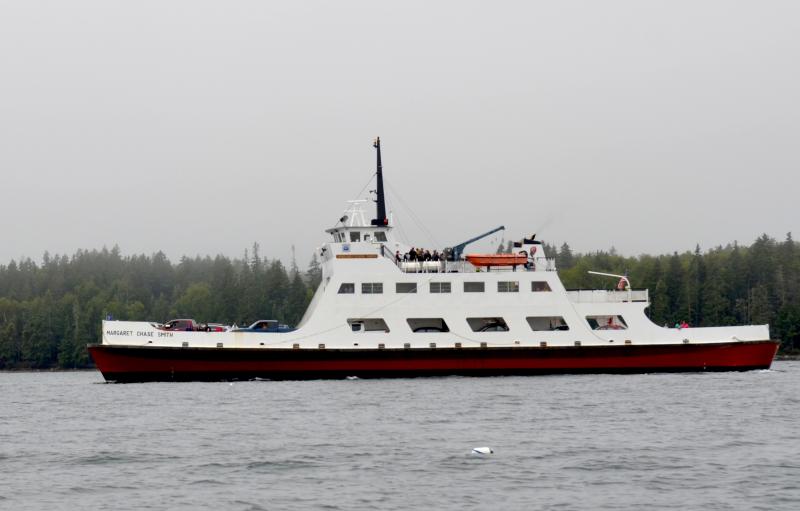Islesboro files appeal of DOT’s new ferry rates in Kennebec County Superior Court
ISLESBORO — The island community of Islesboro is not taking the new ferry rate schedule lightly and has filed an administrative appeal of Maine Department of Transportation action in Kennebec County Superior Court, in Augusta. The appeal was submitted May 23 by Islesboro attorney Mary Costigan, who is with the Portland-based firm Bernstein Shur.
The appeal challenges the DOT implementation of new ferry ticket rates on May 21, which Islesboro maintains were raised “improperly, unfairly, arbitrarily, wrongfully, and unconstitutionally....” to the point that “many long-term island residents and businesses can no longer afford to live or do business on Islesboro.”
(See attached PDF for full appeal as filed)
The rate increase, according to the town and four citizens — Gabriel Pendleton, Select Bord member; Philip T. Seymour, Paul C. Hatch, Jr., and Craig R. Olson — “is also irrational in that all ferry users are being charged a high, flat fee regardless of whether a user is taking a short, three-mile trip or a long 23-mile excursion,” wrote Costigan.
Islesboro wants the court to void Tariff No. 8, and declare it an arbitrary, capricious and unfair approximation of the Islesboro ferry’s cost to the government and benefit to ferry users, thus constituting an illegal taxation without representation.
The town also wants the court to order the DOT to follow the rulemaking process under the Administrative Procedure Act when adopting rates for the Maine State Ferry Service.
In Augusta, the DOT has sealed the gates to any further conversations about Tariff No. 8, which was announced as the new rate structure for the Midcoast island ferries. New ferry ticket prices were released April 17, when the DOT, through the Maine State Ferry Service office, announced that it would implement a new flat rate ticket pricing structure May 21, standardizing ferry prices across the entire system.
Adjusting the ticket prices for flat rates, however, resulted in Islesboro tickets doubling in price and threatening, according to residents and municipal officials, local commerce and trade on Islesboro and the Midcoast communities that lie but one mile across Penobscot Bay.
Belfast, Lincolnville, Camden and Rockport all wrote to the DOT asking the state agency to reconsider the Islesboro rates and discuss the issue.
But the DOT, and the governor’s office, refused to communicate further with Islesboro and legislators, who attempted to talk about the new rates with staff. The DOT denied a request for a stay of their ferry fee schedule implementation.
Read: Maine DOT refuses to postpone ferry ticket increase; Islesboro to forge ahead with appeal
The DOT, meanwhile, has declined to comment about the concerns raised by Midcoast communities, the process by which the rates are recorded in Augusta, and why the need for the May 21 implementation, following nine years of no rate increases.
“Due to potential future litigation, we have our legal staff looking at your questions,” wrote DOT press secretary Ted Talbot, to this reporter, in a May 23 email. “If there are any they feel we can answer then you'll hear from us. However, the position right now is that we are not commenting due to the potential of future litigation.”
Questions included: When was the rule making for the new prices submitted to the Maine Secretary of State office? Is it considered emergency rule making? If so, does that have to first be approved by the Maine Attorney General’s Office? Why the rush to get the new ticket rates in place by May 21? Politicians and government officials on Islesboro say they have not been able to schedule a meeting with the DOT Commissioner to discuss the issue since the DOT enacted the new rates. Is this the case, and why? Is the Commissioner available to talk about this Midcoast issue?
Meanwhile, the administrative appeal filed by Islesboro is funded by the donations made to the town office. Those contributing to legal defense fund for the appeal have been writing checks to the Town of Islesboro.
Islesboro Town Office employees declined to specify what is in the account right now, but said it is “substantial.”
Besides the increase in ticket prices (“The cost of a family with two children to go to the mainland will increase from $26.25 to $52,” wrote Costigan, in her May stay request. “This cost will be added to every doctor’s appointment, grocery trip, music lessons, banking, etc. The dramatic increase in cost will also push out many of the residents who are on fixed incomes as they will no longer be able to afford to pay the ferry fare to attend off-island doctor’s appointments.”), the town is also questioning the process by which the DOT conducted public hearings on the new tariffs.
According to islanders, Tariff No. 8 is different from the rate structure proposed by the DOT last winter, which had been vetted at public hearings. That structure established different rates for in-state and out-of-state residents.
Island citizens rejected that idea, saying it would drive a wedge between the summer residents and year-round residents, all who economically depend on each other.
That was in January and February 2018.
Maine State Ferry Service representatives, who are considered part of the DOT, returned to Augusta, and no more public hearings were held. Then in April, the new rate structure was released to the public.
“MDOT did not hold any public hearings on the rate structure that was ultimately adopted, even though the adopted rate structure was substantially different than the proposed rate structure,” wrote Costigan, in the court filed appeal.
Tariff No. 8 became effective May 21, she wrote, “only 38 days after the decision was signed by the Commissioner and less than one month after the decision was received by the Town.” It was not approved by the Attorney General prior, she added.
The DOT has said, however, that the new tariffs do not constitute a rule change, and used adjudicatory processes allowed under the Administrative Procedure Act.
But Costigan has countered that the DOT acted in error.
“MDOT was required, pursuant to 5 M.R.S.A. § 8052(5)(A),[state statute governing rule making] to adopt a written statement explaining the factual and policy basis for the rule, listing the names of persons whose comments were received, and addressing the specific comments and concerns raised.”
Costigan calls the tariff on Islesboro’s end a revenue-raising device that is not calculated with a fair approximation of the costs to government and the benefit to the individual of the services, “and therefore constitutes a tax on petitioners.”
“The Maine Constitution requires that all taxes be initiated by the Maine House of Representatives,” Costigan wrote.
It is now up to the DOT to respond to the appeal.
Meanwhile, island residents are coping with the new rates in different ways. Some are parking cars permanently in Lincolnville while others are cutting back on their trips to the mainland. Still others are considering selling or leaving their Isleboro homes and moving to the mainland.
Event Date
Address
United States





























